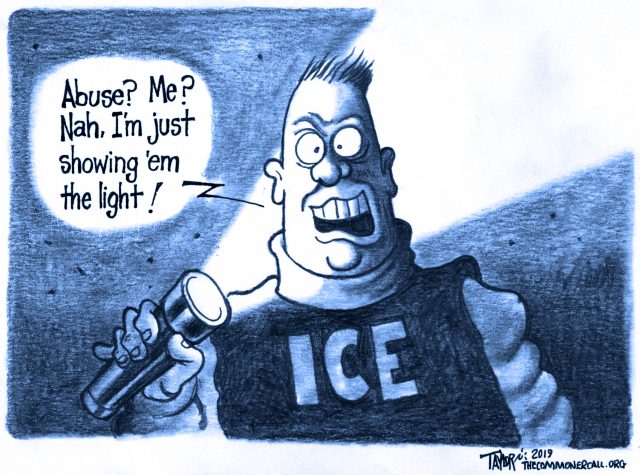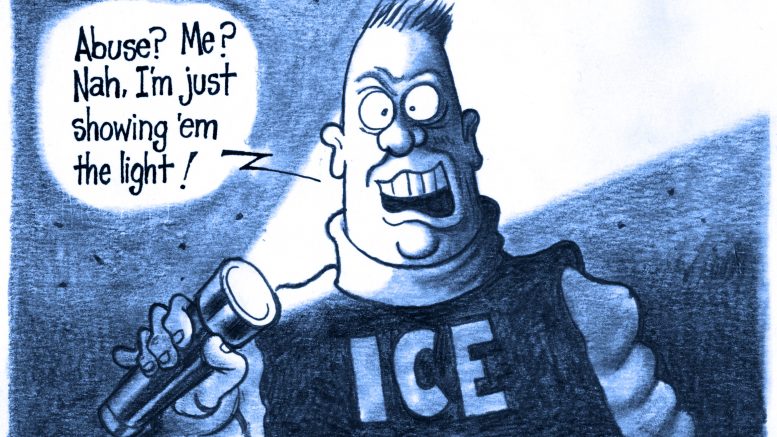
Children reported being punched, shocked with Tasers, and denied food and medicine. Many described being bludgeoned with flashlights.
By A.C. Thompson
ProPublica (5/31/19)
From 2009 to 2014, at least 214 complaints were filed against federal agents for abusing or mistreating migrant children. According to the Department of Homeland Security’s records, only one employee was disciplined as a result of a complaint.
The department’s records, which have alarmed advocates for migrants given the more aggressive approach to the treatment of minors at the border under the current administration, emerged as part of a federal lawsuit seeking the release of the names of the accused agents.
Last month, attorneys for DHS argued before the 9th U.S. Circuit Court of Appeals in San Francisco that disclosing the names of the federal agents would infringe on their right to privacy. A district judge had earlier ordered the department to make the names public.
The fact that only a single case of discipline apparently resulted from more than 200 complaints of child abuse clearly worried the district judge, John Tuchi, of Arizona, who ruled on the matter in the spring of 2018. In his order demanding the release of the names, Tuchi faulted DHS for failing to vigorously investigate claims of misconduct, stating that “completed investigations were almost nonexistent.”
DHS declined to comment for this story.
“We don’t know the number of agents implicated. Is it a handful of agents? Are they clustered in a certain sector? Were any of those agents disciplined?”
The ongoing legal battle stretches back to 2014, when American Civil Liberties Union chapters in Arizona and Southern California began seeking details about the alleged mistreatment of minors apprehended and detained by Customs and Border Protection, an agency within Homeland Security. Using the Freedom of Information Act, attorneys with the ACLU approached DHS with a request for copies of all records regarding the verbal, physical and sexual abuse of minors by Customs or Border Patrol personnel.
The ACLU’s fact-finding initiative came as the federal government struggled to deal with a massive spike in the number of children — many from violence-plagued Central American countries, many unaccompanied by parents — crossing the southern border into the U.S.
Shielding abusers
Hoping to speed the release of the documents, the ACLU later filed suit. While the federal government eventually turned over some 30,000 pages of heavily redacted records, including 214 allegations of child abuse by agents, it has balked at disclosing the names of the Border Patrol and Customs personnel alleged to have harmed minors.
ACLU attorney Mitra Ebadolahi said that without the names of Customs and Border Protection employees — or some other way to identify them, such as tracking numbers — it’s impossible to divine basic facts about the agency’s handling of children. “We don’t know the total number of complaints submitted by a child or on behalf of a child,” Ebadolahi said in an interview, noting that there are likely far more than 214 complaints. “We don’t know the number of agents implicated. Is it a handful of agents? Are they clustered in a certain sector? Were any of those agents disciplined?”
The single disciplinary record released by DHS involved an employee with Immigration and Customs Enforcement who verbally abused a minor.
DHS maintains that the records it has already shared offer a detailed picture of the abuse allegations — including date, location and the substance of the complaint — as well as the government’s efforts to investigate them. For the public, there’s little value in “knowing the names of specific individual agents who have been subject to allegations of misconduct,” said DHS attorney Laura Myron during oral arguments before the 9th Circuit on May 16. Myron stressed that the privacy rights of Border Patrol and Customs employees would be violated by the release of their names in connection with the abuse complaints.
Myron disputed Tuchi’s view that DHS had failed to thoroughly investigate the allegations, saying his statement was not supported by the evidence presented in the case, or the documents turned over to the ACLU.
In court, Judge Sandra Ikuta expressed concern that the ACLU would “harass” the employees and endanger their lives by publishing their names.
“We would accept some alternative [to the release of the names] that would allow the public to look at the records that we’ve obtained and make sense of them, Ebadolahi responded. “There are cases where agencies have done that.”
The complaints unearthed by Ebadolahi and her colleagues, though redacted, offer glimpses of troubling patterns of behavior within the ranks. One boy told investigators “that during his apprehension by Border Patrol agents he was hit on the head with a flashlight. … He sustained a laceration to his scalp that required three (3) staples.” The boy’s story was buttressed by the fact that he had three clearly visible staples closing a fresh wound on his head. Other children reported being punched, shocked with Tasers, and denied food and medicine. Many described being bludgeoned with flashlights.
In one memo, from June 2014, a DHS investigator suggested shutting down an investigation into a minor offense because the department was deluged with a “huge amount of more serious complaints.”
(ProPublica is a nonprofit newsroom based in New York. Sign up for ProPublica’s Big Story newsletter to receive stories like this one in your inbox as soon as they are published.)
- ‘It Feels Like We Are Prisoners’: Migrant Children Describe Trauma At Florida Detention Center — Immigrant children described being put in isolation for eight days, deprived of physical touch and constantly sobbing at a temporary detention center in Homestead, Florida, according to a motion filed by immigration lawyers on Friday. The lawyers claim the facility violates child welfare standards, and want a court order stating the government cannot hold children at Homestead for more than 20 days. “The conditions at Homestead are very similar to conditions in a prison camp,” said Peter Schey, the president and executive director of the Center for Human Rights and Constitutional Law Foundation. “Children detained there suffer tremendous psychological harm.” Some children have been held at the Homestead shelter for more than six months… Read the Rest
(Commoner Call cartoon by Mark L. Taylor, 2019. Open source and free for non-derivative use with link toe www.thecommonercall.org )
*****
‘Beyond Barbaric’: Internal Govt Report Reveals Migrants Forced To Stand On Toilets For Breathing Space At Overcrowded US Detention Center
“[A] cell with a maximum capacity of 12 held 76 detainees, another with a maximum capacity of eight held 41, and another with a maximum capacity of 35 held 155.”
By Jake Johnson
Common Dreams (5/31/19)
A federal immigrant detention facility in El Paso, Texas is so unsanitary and overcrowded that migrants held by the Trump administration were forced to wear “soiled clothing for days or weeks” at a time and stand on toilets to find breathing space in their cells.
That’s according to a not-yet-released report by the Department of Homeland Security’s inspector general, which was obtained exclusively by CNN on Friday.
According to CNN, the inspector general visited the El Paso Del Norte Processing Center unannounced earlier this month and found that the Border Patrol facility—which has a maximum capacity of 125 people—was holding around 750 migrants on May 7 and 900 on May 8.
The report—which observers described as “absolutely appalling” and “horrific“—also detailed overcrowding in the detention center’s individual cells.
CNN, citing logs from the inspector general, reported that a “cell with a maximum capacity of 12 held 76 detainees, another with a maximum capacity of eight held 41, and another with a maximum capacity of 35 held 155.”
“We also observed detainees standing on toilets in the cells to make room and gain breathing space, thus limiting access to the toilets,” states the report.
Blame the victims
When Trump administration officials were notified of the watchdog’s findings, they appeared to place blame on the immigrants themselves.
“The current situation on the border represents an acute and worsening crisis. Our immigration is not equipped to accommodate a migration pattern like the one we are experiencing now,” DHS said in a written response to the inspector general obtained by CNN. “The speed with which illegal migrants are transiting through Mexico to reach our southern border is frustrating our best efforts to respond quickly.”
RAICES, the largest immigration legal services non-profit in Texas, expressed outrage at CNN‘s report on the inspector general’s findings.
“This is insane. Not only can they not move, they can’t breathe, they can’t eat, they can’t do anything like this,” RAICES tweeted. “Children have died and will continue to die if this is not stopped now.”
Rep. Barbara Lee (D-Calif.), in a tweet responding to the watchdog’s findings, called for the resignation of every Trump administration official “involved in this horrific, cruel, and inhumane policy.”
“The administration’s continued treatment of immigrants is beyond barbaric,” said Lee, “and shows exactly how racist and xenophobic Trump is.”
(Our work is licensed under a Creative Commons Attribution-Share Alike 3.0 License. Feel free to republish and share widely.)

